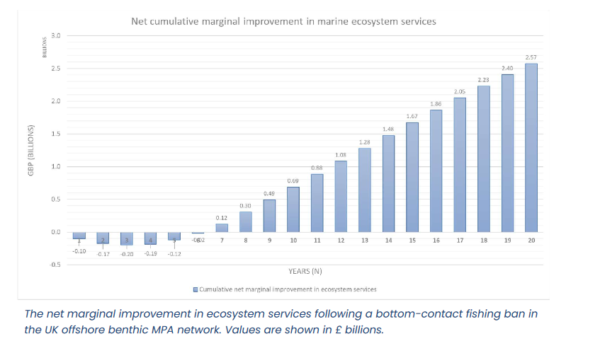A report published by the Marine Conservation Society has calculated the cost-benefit of banning bottom-contact fishing from the UK’s offshore Marine Protected Areas (MPAs) designated to protect seabed features.
The analysis shows that initially, costs outweigh the economic gains of banning bottom-contact fishing gear. Costs include the loss of earnings by fishers, and the setting up and enforcement of the ban. However, these costs are quickly surpassed after 2-4 years, and then are entirely outweighed by the gains achieved over the mid- to long-term.
Image from the summary report published by the Marine Conservation Society available here.
The cumulative impact of removing damaging activities becomes positive after 3-6 years of ecosystem recovery and continues to rise over the next 20 years. The initial net costs are in the order of tens of millions versus several billions in net benefits achieved over a longer period.
When the seabed is left to recover, biodiversity increases, leading to more productive seas, and improved richness and complexity of the seafloor.
Considering the value of the services MPAs could potentially provide society, including carbon storage, removal of pollutants, nutrient cycling and recreational opportunities, the analysis by MCS found that, if protected from all damaging activities, the overall net benefit could amount to between £2.57 billion and £3.5 billion over a 20-year period.
To read more click here. A summary of the report is available here. For the full report click here
